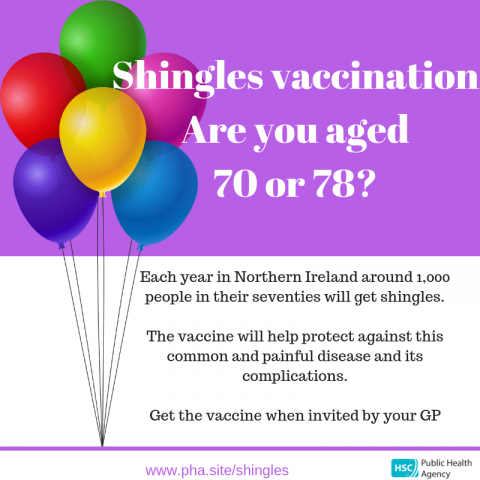PHA encourages uptake of shingles vaccine

The Public Health Agency (PHA) is encouraging people aged 70 and 78 to take up the invitation to get the shingles vaccine.
The vaccine will help protect against this common and painful disease and its complications. Each year in Northern Ireland around 1,000 people in their seventies will get shingles.
The shingles vaccine will be offered routinely to people who are aged 70 years on 1 September 2018 (born between 2 September 1947 and 1 September 1948 inclusive); and as part of a catch-up programme for those aged 78 on 1 September (born between 2 September 1939 and 1 September 1940 inclusive).
Dr Jillian Johnston, Consultant in Health Protection at the PHA, said: “This year there will be around 28,000 new 70 and 78 years olds eligible for this vaccine. Those who were eligible for the vaccine in previous years, but didn’t receive it, can still get the vaccine this year if they are under 80 years of age.”
Latest figures until the end of April 2018 show that last year (2017/18) uptake of the vaccine was 51% for people who turned 70 years of age during the year and 47% for those turning 78 years.
About a quarter of adults will get shingles at some point in their lives. It is caused by the same virus that causes chickenpox. After you recover from chickenpox, some of the virus remains inactive in your body and nervous system. It can then reactivate in later life when your immune system is weakened.
Dr Johnston continued: “Shingles causes a very painful rash and is more likely to affect people as they get older. Also the older people are, the worse it can be, with some people left with pain that can last for years after the rash has healed.
“It is estimated that the vaccination programme will prevent many of the hundreds of cases seen every year in Northern Ireland in people over 70 and reduce the severity of the symptoms for those who do develop the condition.”
The vaccine is given as a single injection in the upper arm but, unlike the flu vaccine, you only need to have it once. Side effects are usually quite mild and don’t last very long. The most common side effects include headache and/or pain and swelling at the site of the injection.
Those who have lowered immunity must not receive the shingles vaccine, including people who are on chemotherapy or who have leukaemia or lymphoma. If you are receiving any treatment, especially if it is prescribed to you at a hospital, check with your GP to make sure you can have the vaccine.
“I would encourage anyone who receives an invitation for shingles vaccine from their GP, to take up the offer if they can,” concluded Dr Johnston.
For further information see: www.pha.site/shingles
